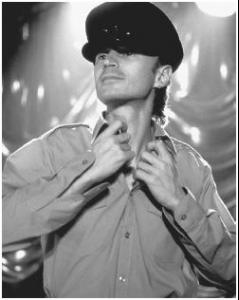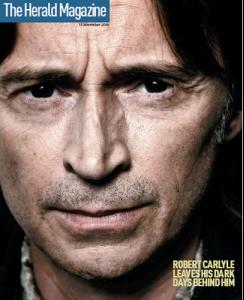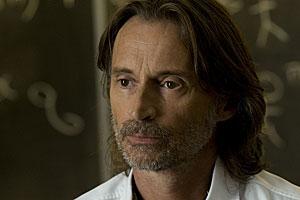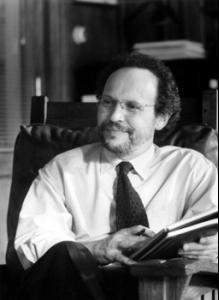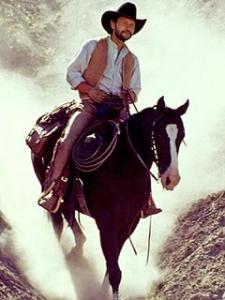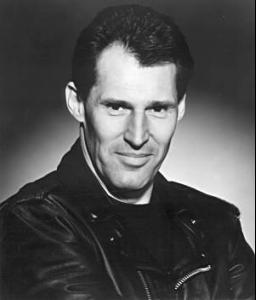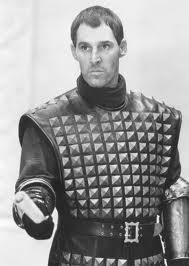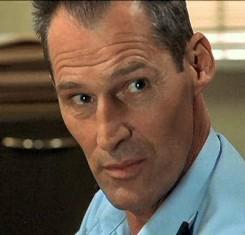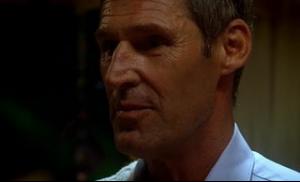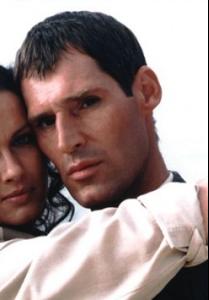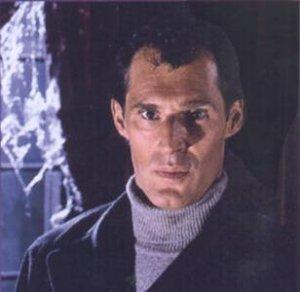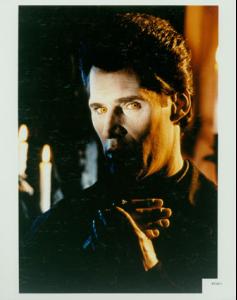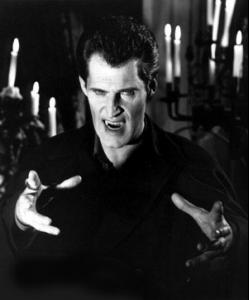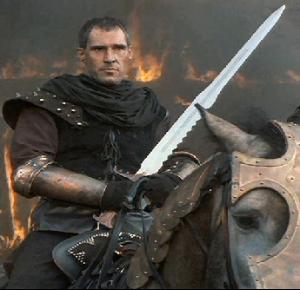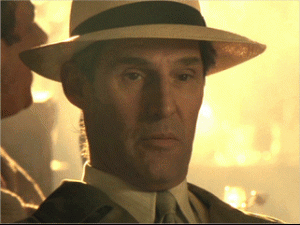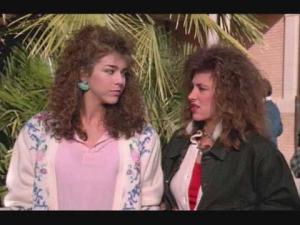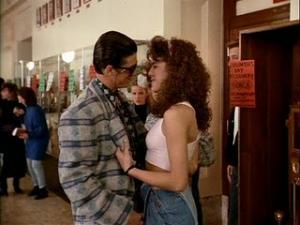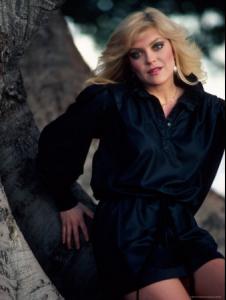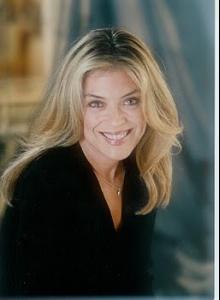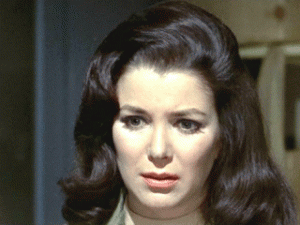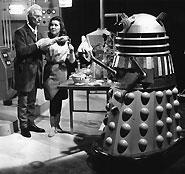
Everything posted by COP11
-
Robert Carlyle
- Robert Carlyle
- Robert Carlyle
Robert Carlyle, (born 14 April 1961) is a Scottish film and television actor. He is known for a variety of roles including those in Trainspotting, Hamish Macbeth, The Full Monty, The World Is Not Enough, Angela's Ashes, The 51st State, and 28 Weeks Later. He also portrayed Doctor Nicholas Rush in Stargate Universe. Early life Carlyle was born in Maryhill, Glasgow, the son of Elizabeth, a bus company employee, and Joseph Carlyle, a painter and decorator. He was brought up by his father after his mother left when Carlyle was four years old. He left school at 16 without qualifications and went to work for his father as a painter and decorator, however he continued his education by attending night classes at Cardonald College in Glasgow. Career Carlyle became involved in drama at the Glasgow Arts Centre at the age of 21 (having been inspired by reading Arthur Miller's The Crucible), and subsequently graduated from the Royal Scottish Academy of Music and Drama. In 1991, he and four friends founded a theatre company, Raindog (which is now primarily involved in television and film work), and guest starred in The Bill. The same year he starred in his first movie, Riff-Raff, directed by Ken Loach. In 1994, he played the gay lover of Father Greg in the film Priest. Carlyle's first high-profile role came as murderer Albie Kinsella in an October 1994 episode of Cracker opposite Robbie Coltrane (in which the character killed no less than five people, including the character DCI David Bilborough, played by Christopher Eccleston). This highly acclaimed role showcased Carlyle's pure intensity. Shortly after his appearance in Cracker, he landed the role of Highland policeman Hamish Macbeth in the BBC comedy-drama Hamish Macbeth. The series ran for three seasons, from 1995 to 1997. In 1996 and 1997, he appeared in the two most high-profile roles of his career to date: that of the psychopathic Francis Begbie in Trainspotting and Gaz, the leader of a group of amateur male strippers, in The Full Monty, the latter earning Carlyle a BAFTA Award for Best Actor in a Leading Role. He also starred with Ray Winstone in the 1997 film Face. Carlyle played the senior Malachy McCourt (father of author Frank McCourt) in the 1999 film adaptation of McCourt's first memoir, Angela's Ashes, the arch villain Renard in the 1999 James Bond film The World Is Not Enough, and a cannibalistic soldier in the 1999 Ravenous. Carlyle appeared in the 2002 Oasis music video for "Little By Little". He played Adolf Hitler in the 2003 miniseries Hitler: The Rise of Evil. In 2006 he played the villain Durza in Eragon. Then in 2007 Carlyle played one of the main characters in the film 28 Weeks Later. He also played the lead role as a marine engineer, attempting to save London from total devastation in the disaster film Flood. That year he also portrayed the role of Father Joseph Macavoy in the film The Tournament. In 2008 Carlyle narrated a BBC audiobook version of The Cutting Room. In 2008, Carlyle was cast as Dr. Nicholas Rush in the television series Stargate Universe. His involvement has been described thus, "As [the team fights] to survive, Dr. Rush (Carlyle) works to unlock the mysteries of the ship and return the group home, but evidence of his ulterior motives soon arises." Carlyle was touted by the studio as the "leading role" in Universe. In December 2008, Carlyle appeared in 24: Redemption, a television movie of the popular series 24, starring alongside Kiefer Sutherland. In 2009, Carlyle appeared in a long-form commercial for Johnnie Walker whiskey, titled "The Man Who Walked Around The World", that showed Carlyle walking down a path and talking for six minutes in a single long take. The ad took two days to film. The director, Jamie Rafn, afterwards referred to Carlyle as an "utter genius". He voices the character of Gabriel Belmont, the hero of the video game Castlevania: Lords of Shadow, released in 2010. Acting style Known for his commitment to authenticity in roles, Carlyle has often altered his lifestyle and physical appearance to better understand a character: before playing a homeless character in Antonia Bird’s 'Safe', he went to live in the Waterloo area of London where the film was set; for his role as a bus driver in Ken Loach’s Carla’s Song, he passed the test for a PSV licence (a licence to drive a bus with passengers) in a Glasgow Leyland Atlantean bus. Personal life Carlyle is the Patron of School For Life Romania, Charity No.1062953. He is married to the makeup artist Anastasia Shirley with whom he has three children: Ava (born 2002), Harvey (born 2004) and Pearce Joseph (born April 2006). The family lives in Glasgow, Scotland. Carlyle is also a supporter of Rangers F.C..- Answer The Question Above !
That I will probably cry watching that movie! Should I go hang out on the SOA set? Howard said I could come up anytime!- Billy Crystal
- Billy Crystal
William Edward "Billy" Crystal (born March 14, 1948) is an American actor, writer, producer, comedian and film director. He gained prominence in the 1970s for playing Jodie Dallas on the ABC sitcom Soap and became a Hollywood film star during the late 1980s and 1990s, appearing in the critical and box office successes When Harry Met Sally... and City Slickers. He has hosted the Academy Awards eight times. Early life Crystal was born in the Doctor's Hospital in Manhattan and grew up in Long Beach, New York, the son of Helen, a housewife, and Jack Crystal, a record company executive and producer of jazz records, who owned and operated the Commodore Record store. His uncle was musician and songwriter Milt Gabler, and his brother, Richard "Rip" Crystal, is a television producer. Crystal grew up in a Jewish family that he has described as "large" and "loving". Billie Holiday was one of Crystal's babysitters during his childhood. After graduation from Long Beach High School, Crystal attended Marshall University in Huntington, West Virginia, on a baseball scholarship, having learned the game from his father, who pitched for St. John's University. Crystal never played a game at Marshall because the program was suspended during his freshman year. He did not return as a sophomore, staying back in New York with his future wife. He then went on to Nassau Community College, and later attended New York University, where he graduated with a B.F.A. from NYU's Tisch School of the Arts in 1970. He was also the Editor-in-Chief of the BG News from 1969–70. Career Television Crystal returned to New York and performed regularly at The Improv and Catch a Rising Star. He studied film and television direction under Martin Scorsese at New York University. In 1976, Crystal appeared on an episode of All in the Family. He was on the dais for the Dean Martin Celebrity Roast of Muhammad Ali on February 19, 1976, where he did impressions of both Ali and sportscaster Howard Cosell. He was scheduled to appear on the first episode of Saturday Night Live (October 11, 1975), but his sketch was cut. He did do a stand-up bit later in that first season as "Bill Crystal", on the April 17, 1976, episode. Crystal's earliest prominent role was as Jodie Dallas on Soap, one of the first unambiguously gay characters in the cast of an American television series. He continued in the role the series' entire 1977–1981 run. After hosting Saturday Night Live in 1984, he joined the regular cast. His most famous recurring sketch was his parody of Fernando Lamas – Fernando, a smarmy talk show host whose catch phrase, "You look... mahvelous!," became a media sensation. Crystal subsequently released an album of his stand-up material titled Mahvelous! in 1985, as well as the single "You Look Marvelous", which peaked at #58 on the Billboard Hot 100 during the same year. Also in the 1980s, Crystal starred in an episode of Shelley Duvall's Faerie Tale Theater as the smartest of the three little pigs. Acting in film and hosting the Oscars Crystal's first film role was in Joan Rivers's 1978 film Rabbit Test. Crystal also made game show appearances such as The Hollywood Squares, All Star Secrets and The $20,000 Pyramid. He holds the record for getting his contestant partner to the top of the pyramid in the bonus round in the fastest time, 26 seconds. Crystal appeared briefly in Rob Reiner's 1984 "rockumentary" This Is Spinal Tap as Morty The Mime, a waiter dressed as a mime at one of Spinal Tap's parties. He shared the scene with a then-unknown, non-speaking Dana Carvey. Crystal's line in the film was "Mime is money." Reiner directed Crystal again in The Princess Bride (1987). Reiner directed Crystal for a third time in the classic romantic comedy When Harry Met Sally... (1989), for which Crystal was nominated for a Golden Globe. Crystal then starred in the buddy comedy City Slickers (1991), which proved very successful both commercially and critically and for which Crystal was nominated for his second Golden Globe. Following the success of these films, Crystal wrote, directed, and starred in Mr. Saturday Night (1992) and Forget Paris (1995). In the former, Crystal played a serious role in aging makeup, as an egotistical comedian who reflects back on his career. He directed the made-for-television movie 61* (2001) based on Roger Maris's and Mickey Mantle's race to break Babe Ruth's single-season home run record in 1961. This earned Crystal an Emmy nomination for Outstanding Directing for a Miniseries, Movie or a Special. Crystal has continued working in film, including Analyze This (1999) and Analyze That (2002) with Robert De Niro, and in the English version of Howl's Moving Castle as the voice of Calcifer. Pixar originally approached him to provide the voice of Buzz Lightyear in Toy Story (1995). He turned down that offer, but regretted it after the film became one of the most popular releases of the year. Crystal later went on to provide the voice of Mike Wazowski in the Pixar film, Monsters, Inc. (2001), which was nominated for the inaugural Best Animated Feature Oscar. Crystal hosted the Academy Awards broadcast in 1990–1993, 1997, 1998, 2000, and 2004; and he reportedly turned down hosting the 2006 ceremony to concentrate on his one-man show, 700 Sundays. His eight times as the M.C. is second only to Bob Hope's 18 in most ceremonies hosted. At the 83rd Academy Awards ceremony in 2011, he appeared as a presenter for a digitally inserted Bob Hope and before doing so was given a standing ovation. Film critic Roger Ebert said when Crystal came onstage about two hours into the show, he got the first laughs of the broadcast. Broadway Crystal won the 2005 Tony Award for Best Special Theatrical Event for 700 Sundays, a two-act, one-man play, which he conceived and wrote about his parents and his childhood growing up on Long Island. He toured the U.S. with the show in 2006 and Australia in 2007. Following the initial success of the play, Crystal wrote the book 700 Sundays for Warner Books, which was published on October 31, 2005. In conjunction with the book and the play that also paid tribute to his uncle, Milt Gabler, Crystal produced two CD compilations: Billy Crystal Presents: The Milt Gabler Story, which featured his uncle's most influential recordings from Billie Holiday's "Strange Fruit" to "Rock Around the Clock" by Bill Haley & His Comets; and Billy Remembers Billie featuring Crystal's favorite Holiday recordings. Philanthropy In 1986, Crystal started hosting Comic Relief on HBO with Robin Williams and Whoopi Goldberg. Founded by Bob Zmuda, Comic Relief raises money for homeless people in the United States. On September 6, 2005, on The Tonight Show with Jay Leno, Crystal and Jay Leno were the first celebrities to sign a Harley-Davidson motorcycle to be auctioned off for Gulf Coast relief. Crystal has participated in the Simon Wiesenthal Center Museum of Tolerance in Los Angeles. Portraying himself in a video, Crystal introduces museum guests to the genealogy wing of the museum. New York baseball On March 12, 2008, Crystal signed a minor league contract, for a single day, to play with the New York Yankees, and was invited to the team's major league spring training. He wore uniform number 60, in honor of his upcoming 60th birthday. On March 13, in a spring training game against the Pittsburgh Pirates, Crystal led off as the designated hitter. He managed to make contact, fouling a fastball up the first base line, but was eventually struck out by Pirates pitcher Paul Maholm on 6 pitches and was later replaced in the batting order by Johnny Damon. He was released on March 14, his 60th birthday. Although a life-long Yankee fan, he is a part-owner of the Arizona Diamondbacks, even earning a World Series ring in 2001 when the Diamondbacks beat his beloved Yankees. In the movie City Slickers, Crystal wears a New York Mets baseball cap. Personal life Billy Crystal and his wife Janice have two daughters, actress Jennifer and producer Lindsay, and are now grandparents. They reside in Pacific Palisades, California. Awards In addition to his Golden Globe Award-nominations, Emmy Awards, and Tony Award, Crystal won the Drama Desk Award for Outstanding One-Person Show for 700 Sundays and received the Mark Twain Prize for American Humor in 2007.- Answer The Question Above !
@LMS CHIBS! Tommy isn't married But Tig comes in a close second And no I haven't. I love Ian McShane so I really want to see it Looking forward to the last Harry Potter movie?- Ben Cross
- Ben Cross
- Ben Cross
Ben Cross (born 16 December 1947) is a British actor of the stage and screen, best known for his portrayal of the British Olympic athlete Harold Abrahams in the 1981 movie Chariots of Fire. Early life Cross was born Harry Bernard Cross in London to a working class Irish Catholic family. His mother was a cleaning woman and his father a doorman and nurse. He began acting at a very young age and participated in grammar school plays – most notably playing Jesus in a school pageant at age 12. Cross was educated at Devonport High School for Boys, a grammar school in the city of Plymouth in Devon, but was bullied by a teacher and left home at 15. Early work Cross initially worked in various jobs including work as a window cleaner, waiter and carpenter. He was master carpenter for the Welsh National Opera and property master at the Alexandra Theatre in Birmingham. In 1970 at the age of 22, he was accepted into London's Royal Academy of Dramatic Arts (RADA) - the alma mater of actors such as John Gielgud, Glenda Jackson and Anthony Hopkins, but later expressed little interest in pursuing the classical route. After graduation from RADA, Cross performed in several stage plays at Duke's Playhouse where he was seen in Macbeth, The Importance of Being Earnest and Arthur Miller's Death of a Salesman. He then joined the Prospect Theatre Company and played roles in Pericles, Twelfth Night, and Royal Hunt of the Sun. Cross also joined the cast in the immensely popular musical Joseph and the Amazing Technicolor Dreamcoat and played leading roles in Sir Peter Shaffer's Equus, Mind Your Head and the musical Irma La Douce – all at Leicester's Haymarket Theatre. Cross's first big screen film appearance came in 1976 when he went on location to Deventer, Netherlands, to play Trooper Binns in Joseph E. Levine's World War II epic A Bridge Too Far which starred an international cast, including Dirk Bogarde, Sean Connery, Michael Caine and James Caan. In 1977, Cross became a member of the Royal Shakespeare Company and performed in the premier of Privates on Parade as “Kevin Cartwright” and played Rover in a revival of a Restoration play titled Wild Oats. Cross's path to international stardom began in 1978 with his performance in the play Chicago in which he played Billy Flynn, the slick lawyer of murderess Roxie Hart. Chariots of Fire During Cross's performance in Chicago, he was recognized and recommended for a leading role in the multiple Oscar-winning Chariots of Fire. Cross's starring role in Chariots of Fire has been credited with continuing a transatlantic trend in elegant young English actors that had been set by Jeremy Irons in Brideshead Revisited, and was followed by Rupert Everett in Dance with a Stranger, Rupert Graves in A Room With a View, and Hugh Grant in Maurice. Cross followed up Chariots of Fire with performances as a Scottish physician, Dr Andrew Mason, struggling with the politics of the British medical system during the 1920s, in The Citadel, a 10-part BBC dramatisation of A. J. Cronin's novel, and as Ashton (Ash) Pelham-Martyn, a British cavalry officer torn between two cultures in the ITV miniseries The Far Pavilions. In 1982, the U.S. union Actors' Equity, in a landmark reversal of a previous ruling, allowed Cross to appear in John Guare's off-Broadway play Lydie Breeze. The decision was tied to a joint effort by Actors' Equity, the League of New York Theaters and the British union Equity to allow British and U.S. actors unrestricted opportunities to work in both countries. The agreement eventually led to regular equal exchange agreements for equivalent acting jobs between London and New York. During the 1984 Summer Olympic Games, Cross appeared in a commercial for American Express ('Don't leave home without it') with the 87-year-old Jackson Scholz, a sprinter for the 1924 American Olympic team whose character was featured in the film Chariots of Fire. When Cross says something about beating Scholz, the latter remarks, "You didn't beat me!" with mock indignation. Proving he is 'still pretty fast', Scholz beats Cross to the draw in picking up the tab with his credit card. He subsequently replaced James Garner as the featured actor endorsing the Polaroid Spectra camera in 1986. Cross was also featured in GQ Magazine as one of the annual “Manstyle” winners in January, 1985 followed by a featured photo shoot in March, 1985. In 1985, he played Barney Greenwald in a hit revival of Herman Wouk's courtroom drama The Caine Mutiny Court-Martial at the Queen's Theatre, London. In a 1985 interview the actor admitted he preferred American roles because of their emotionalism, saying of English acting: 'Over here, people hide behind mannerism and technique and don't come up with any soul. American actors are much freer with the emotions. It's pretty hard in Europe not to have experience of Americans because we're exposed to a lot of American product.' Cross also said that he was sympathetic to the American dream of success: 'I am ambitious. There's no point of being ashamed of the fact that one has ambitions. Despite what a lot of people think in our profession, you can have ambitions and still turn in good work and still earn a living. There's no clash there.' Cross expressed the hope that his reputation would 'span the Atlantic,' and that those in the industry would not ignore him because he did not live in New York or Los Angeles. 'A prospective director would have to convince me that I could bring something new, fresh and exciting to a classical part that hundreds of other people have played,' he said. Over the years, Cross has played Solomon in the 1997 Trimark Pictures production Solomon; Captain Nemo in the 1997 CBS movie 20,000 Leagues Under the Sea; vampire Barnabas Collins in the 1991 MGM miniseries remake of the cult classic soap opera Dark Shadows; another vampire in the 1989 USA Network movie Nightlife; Sir Harold Pearson in the 1994 Italian production Caro Dolce Amore (Honey Sweet Love); Iraqi pilot Munir Redfa blackmailed into flying a MiG from Iraq to Israel in the 1988 HBO spy movie Steal the Sky; and Nazi SS colonel and certified war criminal Helmut von Schraeder, who has his face and voice surgically changed, poses as a Jew, becomes a Zionist and ends up an Israeli major general in the 1989 NBC movie Twist of Fate. 2000 to present Cross played Ikey Solomon in the Australian production The Potato Factory in 2000. In 2005, Cross, an anti-death penalty campaigner, starred as a death-row prisoner in Bruce Graham's play, Coyote on a Fence, at the Duchess Theatre. He played Rudolf Hess in the 2006 BBC production Nuremberg: Nazis on Trial. In November 2007, Cross was cast in the role of Sarek, in the new Star Trek film directed and produced by J. J. Abrams. Cross spoke to Star Trek magazine following the film's release, saying, 'My agent put me forward for Star Trek, and he sent a couple of movies to J.J. I'm sure he was too busy to watch the whole of Species, but when we were on the set, he mentioned to me that there was one particular shot in it where I turned to the camera, and in that moment, it came to him how perfect it would be for me to play Sarek.' In order to prepare for the role, Cross drew on his experience as a parent as well as Sarek's previous on-screen appearances. Having been present when his daughter was born, he was able to 'call on all sorts of things' in the scene where Amanda has baby Spock, a scene which did not make it into the theatrical cut of the film. While he found the emotionless trait of a Vulcan a challenge to play, he found the father/son relationship between Sarek and Spock easier to play. 'As Sarek, I had to be true to the Vulcan cultural ethic, which in the beginning, I found very difficult. I got a lot of help with that from J.J. Dealing with the adult Spock (played by Zachary Quinto) was a much more mature relationship, and I found the father/son aspect one of the easier things to play.' Other professions Cross is a director, writer and musician as well. He has written music, screenplays and articles for English language publications and has also written the lyrics for an album with "Bulgaria's Frank Sinatra", singer Vasil Petrov, which will be released in late 2007. He also sang two Sinatra songs with Petrov in the Apollonia Festival at the Black Sea in September 2007. Among many of his original works is the musical Rage about Ruth Ellis, which was performed in various regional towns in the London area. He also starred in it and played the part of the hangman. Cross's first single as a lyricist was released by Polydor Records in the late 1970s and was titled Mickey Moonshine. The nom de guerre for the performance had occurred to Ben when he recalled an earlier involvement with the music industry as a session singer for Decca between 1972 and 1974. At this time, he had recorded at a moment's notice an uptempo number called 'Name it, You Got it', when the scheduled performer had failed to arrive at the studio on time. Interestingly, this recording achieved some play on the British Northern Soul scene and Ben intends to reprise his performance as Micky Moonshine at a forthcoming Northern event. Other works include The Best We’ve Ever Had and Nearly Midnight, both written by Cross and directed by his son Theo. In addition, the original soundtrack for Nearly Midnight was written, produced and performed by his daughter Lauren. These works were performed in Edinburgh, Scotland, in 2002 and 2003 respectively. Square One, directed by Cross, was performed at the Etcetera Theatre in London in 2004. Personal life Cross has lived all over the world, including London, Los Angeles, New York, Southern Spain, Vienna, and, most recently, Sofia. He is familiar with the Spanish, Italian and German languages and enrolled in a course studying Bulgarian. He has been married twice: first to Penny, from 1977 to 1992, with whom he has two children named Lauren and Theodore; and then to Michelle until 2005. Filmography A Bridge Too Far (1977) The Flame Trees of Thika (TV Series) (1981) Chariots of Fire (1981) The Citadel (1983) The Far Pavilions (1984) L'Attenzione (1984) The Assisi Underground (1985) Paperhouse (1988) Steal the Sky (1988) The Unholy (1988) The Jeweller's Shop (1988) La Bottega dell'orefice (1989) Nightlife (1989) Twist of Fate (1989) Eye of the Widow (1989) Dark Shadows (Revivals) (1991) Live Wire (1992) The Criminal Mind (1993) Cold Sweat (1993) The Ascent (1994) Temptress (1994) Caro dolce amore (1994) First Knight (1995) El Último viaje de Robert Rylands (1996) The Invader (1997) 20,000 Leagues Under the Sea (1997) The Corporate Ladder (1997) Turbulence (1997) Solomon (1997) The Venice Project (1999) The Order (2001) Young Blades (2001) She Me and Her (2002) Trial and Retribution 7 (2003) Exorcist: The Beginning (2004) Icon (2005) The Mechanik (2005) Wicked Little Things (2006) Undisputed II: Last Man Standing (2006) Finding Rin Tin Tin (2007) When Nietzsche Wept (2007) War, Inc. (2008) Hero Wanted (2008) Star Trek (2009) William and Kate (2011) - TV Movie- Answer The Question Above !
No. Like they would anyways Well I am just fine not being Little Miss Popular Do you tend like a model or an actress because everyone else does?- Tina Caspary
Tina Caspary (born December 28, 1970) is an American actress, dancer and choreographer. She gained moderate attention in the late 1980s with Can't Buy Me Love. Early life Caspary grew in Southern California and has worked in every facet of the entertainment industry. She developed a vivid interest in dancing at a very young age, influenced by her mother, Brenda. She is the older sister of choreographer/dancer Dee Caspary and is now married to Ryan Cyphert. Career In the mid to late 1980s she had many minor roles in teen movies. Her first role was as a dancer in the 1982 movie Annie. In Combat Academy (also known as Combat High), Caspary starred alongside George Clooney. She also appeared on the TV series Silver Spoons in 1985. In December 1986, the then 15-year-old Caspary was cast as Kelly Bundy on the Fox sitcom Married... with Children. However, she was soon after replaced by Christina Applegate. The show's producers felt Caspary's acting didn't fit the role. The pilot episode of the show was taped on December 12, 1986. In 1987, Caspary was nominated for the Young Artist Award in the Exceptional Young Actress Starring in a Television Special or Movie of the Week category for the 1986 TV movie News at Eleven, also starring Martin Sheen. Later that year, she landed a minor, yet important role in Can't Buy Me Love (alongside Patrick Dempsey and Amanda Peterson), resulting in a nomination for the 1988 Young Artist Award in the Best Young Actress in a Motion Picture - Comedy category. In 1988 Caspary starred in Mac and Me, which now has a cult following. For that movie, she received her third Young Artist Award nomination in early 1989. Caspary had a major role in My Mom's a Werewolf in 1989. The same year she starred in her last movie to date, Teen Witch alongside actors Robyn Lively and Dan Gauthier. After that movie, Caspary quit acting and focused on her career as a dancer. She has appeared in music videos of Red Hot Chili Peppers and Reba McEntire. She was a principal dancer on the Academy Awards for five years with Debbie Allen and she has also done television commercials. In 1996, Caspary launched a line of dance clothing called Katrina Activewear. Today, Tina Caspary and her husband Ryan Cyphert are also part of the faculty of SHOCK the Intensive, a one-day dance incentive Filmography 1982 Annie Dancer as Tina Maria Caspary 1985 Silver Spoons unknown episode 1986 News at Eleven Gretchen Kent TV movie Combat Academy Mary Beth TV movie The Thanksgiving Promise 1st Girl TV special 1987 Totally Minnie Dancer TV special Growing Pains Jamie "Choices" (Season 2, Episode 11) Married... with Children Kelly Bundy 1 episode (unaired pilot) Can't Buy Me Love Barbara Alternative title: Boy Rents Girl 1988 Mac and Me Courtney as Katrina Caspary 1989 Day by Day Linda 1 episode, as Katrina Caspary My Mom's a Werewolf Jennifer Shaber as Katrina Caspary Teen Witch as Tina Marie Casapary- Lydia Cornell
- Lydia Cornell
Lydia Cornell (born July 23, 1962) is an American actress, writer, novelist, comedienne, blogger, and talk-radio host. Early life and acting career Born in El Paso, Texas, Cornell began acting in the early 1980s. Her first role was as Ted Knight's daughter Sara on the ABC television situation comedy Too Close for Comfort from 1980 to 1985. She has also appeared on numerous television programs over the years, including Curb Your Enthusiasm, The Drew Carey Show, Quantum Leap, Full House, Knight Rider, The Dukes of Hazzard, The A-Team, T. J. Hooker, Simon & Simon, Hunter, Hardball, Black Scorpion, Love Boat (5 episodes), Hotel (2 episodes), Fantasy Island, Charlies Angels, Battle of the Network Stars, TV's Bloopers & Practical Jokes, and Dick Clark's New Year's Rockin' Eve as co-host with Anson Williams. She also co-starred with Oscar winners James Earl Jones, Jose Ferrer and Lila Kedrova in the horror film Blood Tide filmed in the Greek Isles and produced by Niko Mastorakis and Donald Langdon. On December 4, 2010, Cornell hosted the live stream for Variety's Power of Comedy event at Nokia Center, honoring Russell Brand, benefiting the Noreen Fraser Foundation. She interviewed Brand, Helen Mirren, Justin Long, Bob Sagett, Sarah Silverman, B.J. Thomas, Patton Oswalt, Gene Simmons (whom she jokingly referred to as "the man who stole my husband" and attributes her 2010 divorce to. Her ex-husband Paul Hayeland went on the road with the KISS tour in the new KISS bus to market Simmons' Axe Bass Guitars in 2010. Hayeland also appeared in episodes of A&E's Gene Simmons Family Jewels during the 2010 season, prompting Cornell to lament: "My husband gets a job on a hit series, and he doesn't even have flat abs, while I have to danced naked under bad lighting to even audition for a job as a hooker or desperate housewife!" In 2005, she appeared on HBO's Curb Your Enthusiasm. She broadcasts a weekly live interactive Ustream TV show, and is currently writing original comedy series, inspirational talk shows and live programming for her own channel on Kelsey Grammer's new network. In spring of 2010, she appeared in the Kelsey Grammer-Bill Zucker Comedy Hour, a series of improvisational vignettes, with Scott Baio, Kelsey Grammer and Bill Zucker, whom she met on Twitter. Cornell performed a song in Zucker's Twitter Song video. Cornell describes her brand of comedy, "Spiritual Therapy Comedy." Cornell was a Best Actress nominee at Method Fest, which honors outstanding acting performances, for her leading role in the AFI indie "Miss Supreme Queen." She is currently filming the feature film "Cats Dancing on Jupiter", directed by Jordan Alan, starring Amanda Righetti of "The Mentalist." She is also in Dean Grakal's upcoming release "Miami, Nancy and Me" with Robert Downey Jr, Jon Bon Jovi, Gary Oldman and Sarah Silverman. She also costars in the indie films Damage Done and Happy Holidaze from the Joneses directred by the Canter Brothers. As part of a USO tour, Cornell went to Beirut, Lebanon, to a war zone, to visit American troops in the Multinational Peacekeeping Force Christmas Eve 1982. She visited the Marines in underground bunkers as well as sailors and naval officers aboard the USS Sumnter, USS Shreveport and USS Inchon. Shortly after their departure from Beirut, over 250 Marines of the 24th MAU were killed there in one of the first suicide bombings. A truck entered the barracks as the troops slept, killing them all. Literary and journalistic career Cornell's self-titled blog was a 2006 and 2005 Koufax Award double nominee for best writing, and has been called "a consistently thought-provoking firecracker of pointed socio-political commentary and observant, caustic wit." (Shotgun Reviews.) John Conley, a Marine combat vet, sent her his Purple Heart for her courage in standing up to Ann Coulter's "extermination speak", and about the war in Iraq. Cornell is a humorist and comedienne, and performs stand-up comedy with Destiny (The Tonight Show, MTV, VH-1.) The duo did 14 shows at the Riviera Las Vegas in June 2006. In November, they opened for Paul Rodriguez at Pechanga, and for The Amazing Johnathan at The Sahara in Las Vegas. Cornell is a "spiritual therapy comedienne." Cornell recently starred in an original comedy show in Hollywood with Destiny and Stephanie Hodge titled "Pain is Inevitable, Sex Optional". It is an ongoing comedy about marriage,sex, men, love, death and politics as told by three women. The first in a series of new books will be out in 2010. Cornell has written books on Stalin and the Trotsky assassination, several comedies, theater pieces and films — including the black comedy "Venus Conspiracy", which she wrote and co-starred in with Deborah Van Valkenburgh, who co-starred with her as her character's sister in Too Close for Comfort. Cornell has several other books awaiting publication. Her articles have appeared in Huffington Post; Editor & Publisher; the Lone Star Iconoclast; CNN; Crooks and Liars; Sitcoms Online; Retroality; Good Housekeeping; TV Guide; Femmes Fatales; Macon Area Online and several newspapers across the nation. Her article "Death is Sexier than Sex...to Ann Coulter" was published by BradBlog in December 2005 causing an uproar when Coulter published Cornell's home phone number and private email on the front page of her website, Ann Coulter.com. Cornell received death threats, hate mail, but mainly she received hundreds of letters and calls in support of her statements. The story was subsequently picked up by MSNBC's Keith Olbermann; Editor & Publisher, Huffington Post, Crooks and Liars, CannonFire, and numerous online news sources. On Saturday, February 24, 2007, Basham Radio introduced Cornell as its new co-host. Basham and Cornell Radio- Jill Curzon
Jill Curzon is a British actress most famous for her film and television appearances during the 1960s. Her television appearances include The Champions (1969), Adam Adamant Lives! (1967), The Saint (1965), Hugh and I and Disneyland (1963). Curzon's film roles include Louise, the niece of Doctor Who (Peter Cushing) in the 1966 film Daleks' Invasion Earth: 2150 A.D., and an appearance in Smokescreen (1964). More recently she was interviewed about her role as Louise in Daleks' Invasion Earth: 2150 A.D. in the 1995 Dalekmania documentary.- Answer The Question Above !
Sorry but I love Tommy!!!! And he will stay!- Answer The Question Above !
Yes as long as I'm not insulted any more. And you haven't been the only one Aranka. In case you haven't noticed I am not the most popular person on here. Is anyone else tired of hearing about Blake Lively!!- Answer The Question Above !
Not really Ever gonna change to someone else besides Dita?- Best of Advertisement Images.
1.5- Answer The Question Above !
Not really What would you do if one of your kids came home with a tattoo?- Answer The Question Above !
No. I can play Diner Dash though Should I go see Nick's fight in October?- Veruschka von Lehndorff
Those are beautiful! One of the greatest models of all time- Answer The Question Above !
Hell if I know Do you play Game of Warcraft?- Good Or Bad !
- I Am...
- Robert Carlyle
Account
Navigation
Search
Configure browser push notifications
Chrome (Android)
- Tap the lock icon next to the address bar.
- Tap Permissions → Notifications.
- Adjust your preference.
Chrome (Desktop)
- Click the padlock icon in the address bar.
- Select Site settings.
- Find Notifications and adjust your preference.
Safari (iOS 16.4+)
- Ensure the site is installed via Add to Home Screen.
- Open Settings App → Notifications.
- Find your app name and adjust your preference.
Safari (macOS)
- Go to Safari → Preferences.
- Click the Websites tab.
- Select Notifications in the sidebar.
- Find this website and adjust your preference.
Edge (Android)
- Tap the lock icon next to the address bar.
- Tap Permissions.
- Find Notifications and adjust your preference.
Edge (Desktop)
- Click the padlock icon in the address bar.
- Click Permissions for this site.
- Find Notifications and adjust your preference.
Firefox (Android)
- Go to Settings → Site permissions.
- Tap Notifications.
- Find this site in the list and adjust your preference.
Firefox (Desktop)
- Open Firefox Settings.
- Search for Notifications.
- Find this site in the list and adjust your preference.




